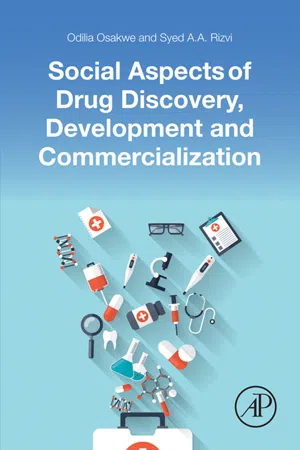
Social Aspects of Drug Discovery, Development and Commercialization
- 324 pages
- English
- ePUB (mobile friendly)
- Available on iOS & Android
Social Aspects of Drug Discovery, Development and Commercialization
About This Book
Social Aspects of Drug Discovery, Development and Commercialization provides an insightful analysis of the drug discovery and development landscape as it relates to society. This book examines the scientific, legal, philosophical, economic, political, ethical and cultural factors that contribute to drug development. The pharmaceutical industry is under scrutiny to develop safer and more effective drugs in a quicker and more affordable manner. Recent criticism and debates have emphasized varying opinions on the issues concerning the drug discovery and development process.
This book provides thoughtful and valuable discussions and analysis of the social challenges and potential opportunities through all stages of the pharmaceutical process, from inception through marketing. With a unique focus on the social factors that increasingly play a role in how drug development is planned, structured, and executed throughout the drug product lifecycle, this is an essential resource for students, professors, and researchers who seek a better understanding of the interface between the pharmaceutical industry, health care systems, and society.
- Organized in a sequence of interrelated theories and principles that provide the foundation for increased understanding of the relevant social aspects
- Includes analysis of important new advances, key scientific and strategic issues, and overviews of recent progress in drug development
- Provides a global perspective with examples from developed areas, such as the US, Japan, Canada and Europe, as well as faster-growing and emerging economies including Brazil, Russia, India, and China
- Serves as an essential resource for students, professors, and researchers who seek a better understanding of the interface between the pharmaceutical industry, health care systems, and society
Frequently asked questions
Information
Prediscovery Research: Challenges and Opportunities
Abstract
Keywords
4.1. Introduction
Table of contents
- Cover
- Title page
- Table of Contents
- Copyright
- Dedication
- Preface
- Introduction
- Section I: Pharmaceutical Industry, Society, and Governance
- Section II: Drug Discovery Cycle I: Discovery and Preclinical Drug Development
- Section III: The Drug Discovery Cycle II: Clinical Development
- Section IV: The Drug Discovery Cycle III: Authorization and Marketing
- Index